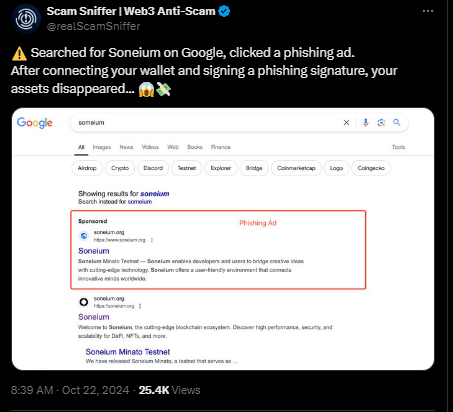The blockchain security firm Scam Sniffer has reported a dangerous phishing scheme linked to Sony’s blockchain project, Soneium. According to an October 22 post on X, a sponsored ad appeared in Google search results for “someium,” directing users to a malicious website designed to drain crypto wallets.
Scam Sniffer’s team searched Soneium and stumbled upon the deceptive ad. “Searched for Soneium on Google, clicked a phishing ad,” they cautioned, emphasizing that phishing can strike when users least expect it—even from simple typos like “someium.”

While it was unable to Scam Sniffer’s search results, the security firm provided evidence of the phishing link, revealing a site that used a different domain suffix than Soneium’s official website. The fraudulent page masqueraded as a British-based radiology service, raising further concerns about the sophistication of such scams.
Scam Sniffer explained that the website’s creators employed specific tactics to obscure the malicious content from Google’s detection systems, making it challenging for potential the threat until it was too late. “It’s hard to see it unless you are targeted, and that’s why Google couldn’t know about it,” they stated.
As of now, Google has not commented on the alleged phishing link, leaving many to wonder how such dangerous ads can slip through the cracks in search algorithms.
Earlier in the month, Scam Sniffer revealed that over $46 million was stolen from approximately 10,800 victims through phishing scams in September alone. The third quarter of 2024 saw over $127 million in cryptocurrencies siphoned from unsuspecting investors, with Ether wallets being the primary target.
In a previous report, Scam Sniffer noted that more than $4 million was pilfered in just a few weeks due to malicious phishing sites promoted via Google Search. Scammers frequently create domain names that closely resemble those of legitimate crypto brands, making it increasingly difficult for users to discern between safe and harmful links.
Also Read: Cryptomist X account got Hacked with Job offering scam







